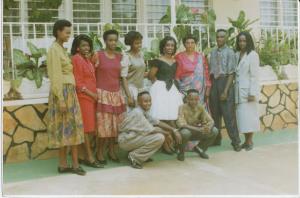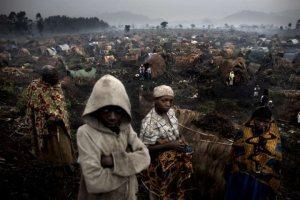
Picture – Genocide archive Rwanda
Historically, and in many parts of the world, social and political changes have been achieved, through violent and devastating wars. Peaceful societal transformations have most of the time, if not always, been slow and rare in humankind’s evolution.
In the case of Rwanda, particularly in its recent past, the majority

Hunted Rwandan refugees in DRC in 1997
among the millions of people who managed to survive the 90/94 civil war remembers painfully that period. As we know, it ended with the Rwandan genocide and RPF’s leadership led by President Paul Kagame taking over political power in the country.
The sad side of what happened in Rwanda from October 1st, 1990 to July 4th, 1994 is not that it did occur, but the fact that it did not end when it was supposed to. Officially, this was when the interim government of Prime Minister Jean Kambanda was defeated.
In essence, an objective evaluation of the aftermath of the Rwandan genocide from different angles, including social, humanitarian, economical, and geopolitical, would agree that the invasion of Rwanda by RPF has brought to the region
• a state of permanent political insecurity and social tensions between Tutsi and other populations
• an increased impoverishment of masses
• an institutionalisation of Tutsi supremacist policies in both Rwanda and the Democratic Republic of Congo
• deliberate Rwandan government policies of dehumanisation of the rest of citizens who are not Tutsi
From a statistical point of view, human lives which have been lost after the Rwandan genocide and or affected by the RPF government policies, both in Rwanda and DRC, exceeds significantly the death toll of before the rule of President Kagame over the country.
False war of “liberation”
From a victim or survival perspective, considered what came after RPF getting power in Rwanda, calling the period running from 1990 to 1994 a civil war of liberation led by RPF would seem an aberration.
However, this is how all past wars in any part of the world have been described by victorious sides once the so called enemy was defeated. For the victors, the concept of “liberation” does not take into account the feelings or views of the victims and survivors, or their experience of the war tragedy and particularly its aftermath, but only the understanding of those who benefit from the occasioned and sometime dramatic change.
In today’s Rwanda there are more people oppressed than there were before the genocide. Certainly the old generation of Rwandans which, among present victims of RPF rule, has experienced pre-independence era can tell how different the two periods are. But from what history books say and people can see, between the way the Tutsi rule was then and the way it is today, parallels are striking in all areas of the country’s life. The only critical difference is that ongoing repression of citizens can be globally exposed.
In the light of what president Paul Kagame advocates as current reconciliation among Rwandans, claimed past harmony between Hutu and Tutsi appears to have been and still is a complete lie. The truth has always been that the oppressors ensure that the oppressed cannot bring out their suffering. That explains the reason they endure their pain longer than necessary. And when it finally gets in the open, it has left scars in people’s lives that take generations to heal.
Since 1994, RPF government has lied to Rwandans and the entire world that it had been working towards their total reconciliation, after having caused to them the worst tragedy anyone can encounter in their lives: death. It has lamentably failed in bringing back their harmonious way of life that the post independence governments tried to gradually build. Rwandans are today more suspicious of each other than at any time of their history. And this has been a deliberate policy of Paul Kagame in order to divide and rule them.
Kigali’s external sponsors have started distancing themselves from its crimes, especially those committed in the Democratic Republic of Congo. As a consequence of the current situation, or mistakes made by RPF under its eighteen years long rule, and further to multiple efforts of those seeking change in Rwanda, it appears that Paul Kagame’s regime is approaching its end.
This should not surprise. Change is part of the nature of things that exist. Sometime trying to resist its course seems futile. Confronted with political change in Rwanda, there are those in the opposition, that I consider as strongly self-centred and selfish, who are somehow unconcerned of the well-being of the population. They seem impatient and ready to use any means to get the Rwandan dictatorship out of power. As did RPF by invading Rwanda in October 1990, they advocate for an armed struggle to remove Paul Kagame from office.
That an armed struggle be understandable in some circumstances, if those who embark on it could foresee the victims and the outcome, and most importantly put themselves in the shoes of widows, orphans, dispossessed, homeless and other disenfranchised categories of people any war creates, there would be change of strategies in fundamentally renewing societal institutions.
Valuing past, present and future Rwandan lives
If one values somebody else life, it becomes difficult to let it be wasted or contribute to such process. Any Rwandan politician who would prioritise or sees as necessary the use of armed struggle to bring change in Rwanda wouldn’t be significantly different from the RPF regime of President Paul Kagame.
It would be a total contradiction of any political objective of bringing genuine peace to the country. In addition, this wouldn’t be a way of valuing the sacrifice of those who died trying to change Rwandan politics. Though, so far, it looks as if they offered their lives in vain since their contribution worsened what they intended to change.
Valuing lives of present and future Rwandans calls from all politicians who are working for change in their country to avoid any initiative which would get citizens again massacred in the millions by irresponsible rebel/opposition and government leaders as this was yesterday.
The only logic which should guide political change in Rwanda is that the country cannot afford another war of “liberation.” But Rwandans keen on a renewal of society need to work strongly together on an effective strategy to liberate it politically and peacefully.
